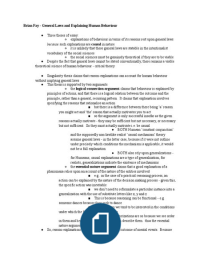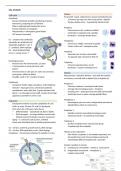Brian Fay - General Laws and Explaining Human Behaviour
● Three theses of essay:
○ explanations of behaviour in terms of its reasons rest upon general laws
because such explanations are causal in nature
○ it is unlikely that these general laws are statable in the intentionalist
vocabulary of the social sciences
○ the social sciences must be genuinely theoretical if they are to be viable
● Despite the fact that general laws cannot be stated conventionally, there remains a viable
theoretical science of human behaviour - critical theory
● Singularity thesis claims that reason-explanations can account for human behaviour
without implying general laws
● This thesis is supported by two arguments
○ the logical-connection argument claims that behaviour is explained by
principles of actions, and that there is a logical relation between the outcome and the
principle, rather than a general, recurring pattern. It claims that explanation involves
specifying the reasons that rationalise an action
■ but there is a difference between there being ‘a’ reason
you might act and ‘the’ reason that actually motivates you to act
■ so the argument is only successful insofar as the given
reasons actually motivate - they may be sufficient but not necessary, or necessary
but not sufficient. So they must actually motivate i.e. be causal
● BOTH Humean ‘constant conjunction’
and the supposedly non-lawlike realist ‘causal mechanism’ theory
assume general laws - in the latter case, because if it were not outline
under precisely which conditions the mechanism is applicable, it would
not be a full explanation
● BOTH also rely upon generalizations -
for Humeans, causal explanations are a type of generalization, for
realists, generalizations indicate the existence of mechanisms
○ the essential-nature argument claims that a good explanation of a
phenomena relies upon an account of the nature of the entities involved
■ e.g.. in the case of a practical reasoning process, an
action can be explained by the nature of the decision making process - given this,
the specific action was inevitable
■ we don’t need to reformulate a particular instance into a
generalization with the use of substitute letters like x, y and z
■ This is because reasoning can be functional - e.g.
someone dances because they seek to dance
■ for this reason we tend to be interested in the conditions
under which the function doesn’t operate
■ functional characterizations are so because we see order
in them and hence assume general laws can describe them. thus the essential
nature argument fails. fucking duh.
● So, reason-explanations view actions as the causal outcome of mental events. Because
● Three theses of essay:
○ explanations of behaviour in terms of its reasons rest upon general laws
because such explanations are causal in nature
○ it is unlikely that these general laws are statable in the intentionalist
vocabulary of the social sciences
○ the social sciences must be genuinely theoretical if they are to be viable
● Despite the fact that general laws cannot be stated conventionally, there remains a viable
theoretical science of human behaviour - critical theory
● Singularity thesis claims that reason-explanations can account for human behaviour
without implying general laws
● This thesis is supported by two arguments
○ the logical-connection argument claims that behaviour is explained by
principles of actions, and that there is a logical relation between the outcome and the
principle, rather than a general, recurring pattern. It claims that explanation involves
specifying the reasons that rationalise an action
■ but there is a difference between there being ‘a’ reason
you might act and ‘the’ reason that actually motivates you to act
■ so the argument is only successful insofar as the given
reasons actually motivate - they may be sufficient but not necessary, or necessary
but not sufficient. So they must actually motivate i.e. be causal
● BOTH Humean ‘constant conjunction’
and the supposedly non-lawlike realist ‘causal mechanism’ theory
assume general laws - in the latter case, because if it were not outline
under precisely which conditions the mechanism is applicable, it would
not be a full explanation
● BOTH also rely upon generalizations -
for Humeans, causal explanations are a type of generalization, for
realists, generalizations indicate the existence of mechanisms
○ the essential-nature argument claims that a good explanation of a
phenomena relies upon an account of the nature of the entities involved
■ e.g.. in the case of a practical reasoning process, an
action can be explained by the nature of the decision making process - given this,
the specific action was inevitable
■ we don’t need to reformulate a particular instance into a
generalization with the use of substitute letters like x, y and z
■ This is because reasoning can be functional - e.g.
someone dances because they seek to dance
■ for this reason we tend to be interested in the conditions
under which the function doesn’t operate
■ functional characterizations are so because we see order
in them and hence assume general laws can describe them. thus the essential
nature argument fails. fucking duh.
● So, reason-explanations view actions as the causal outcome of mental events. Because











